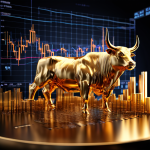
What is Control Group Psychology? Unravelling the Herd Mentality in the Stock Market
May 22, 2024
The Madness of Crowds in the Stock Market
The stock market is a prime example of how crowd psychology and herd mentality can lead to irrational exuberance, panic selling, and wild swings driven more by emotion than reason. As H.L. Mencken astutely observed, “The whole aim of practical politics is to keep the populace alarmed (and hence clamorous to be led to safety) by menacing it with an endless series of hobgoblins, most of them imaginary.” While Mencken was referring to politics, the same principle applies to the fear and greed that often drive stock market activity.
Savvy investors and institutions who understand mass psychology can exploit the “madness of crowds” and profit handsomely. They recognize, as Mencken did, that “the lower orders of men are incurable rascals, either individually or collectively.” In other words, the average investor is prone to making irrational, emotionally driven decisions – especially when caught up in the frenzy of a surging bull market or a panic-stricken crash.
The Greater Fool Theory
One of the key psychological factors in the stock market is the “greater fool theory.” This theory suggests that investors often buy overvalued assets not because they believe in their intrinsic value but because they believe they can sell them to an even greater fool at a higher price. As Mark Twain wryly noted, “A mine is a hole in the ground with a liar at the top.”
This mentality can lead to speculative bubbles as investors chase ever-higher returns without regard for fundamentals. **The more significant fool theory relies on the assumption that there will always be a bigger sucker waiting in the wings, ready to buy at an even more inflated price.** Of course, when the music stops, and the greater fools run out, the bubble bursts, leaving many investors holding the bag.
Historical Examples of Market Mania
Throughout history, numerous examples of speculative bubbles and subsequent crashes have been fueled by the powerful forces of crowd psychology and herd mentality. From the Dutch Tulip Mania of the 1600s to the Dot-com bubble of the late 1990s, these episodes demonstrate how easily asset prices can soar far beyond any rational valuation, only to come crashing down to earth when reality sets in.
One of the most famous examples is the Dutch Tulip Mania, which occurred in the Netherlands during the 1630s. During this period, tulip bulbs became highly sought-after, with prices reaching astronomical levels. At the peak of the mania, a single tulip bulb could sell for more than ten times the annual income of a skilled craftsman. However, the bubble eventually burst, and prices collapsed, leaving many investors in financial ruin.
Fast-forward to the late 1990s, and we see a similar pattern with the Dot-com bubble. During this time, internet-related companies experienced a massive surge in popularity and valuation, with many achieving multi-billion dollar market caps despite having little to no revenue or profits. Investors caught up in the hype and the fear of missing out poured money into these companies, driving prices even higher. However, when the bubble burst in 2000, many of these companies went bankrupt, and investors suffered significant losses.
As Mark Twain famously quipped, “History doesn’t repeat itself, but it often rhymes.” While the specific asset classes and circumstances may change, the underlying psychology remains the same. **Greed, fear, and the herd mentality continue to drive markets to extremes.**
Legendary investor Peter Lynch also recognized the dangers of market manias and the importance of maintaining a rational perspective. In his book “One Up on Wall Street,” Lynch wrote, “The key to making money in stocks is not to get scared out of them.” He emphasized the importance of doing your research and not getting caught up in the hype and emotion of the market.
Lynch also cautioned against the dangers of following the crowd, noting, “The person that turns over the most rocks wins the game. And that’s always been my philosophy.” In other words, successful investing requires independent thinking and a willingness to go against the grain when necessary.
Another key insight from Lynch is the concept of “teabaggers” – investments that increase in value by ten times or more. While these opportunities are rare, Lynch believed they could be found by focusing on fundamentals and identifying companies with solid growth prospects undervalued by the market. By avoiding the noise and hype of market manias and concentrating on these fundamental principles, Lynch achieved remarkable success as an investor.
The Wisdom of Contrarians
Those who can resist the siren song of the crowd and maintain a rational, contrarian perspective are often the ones who emerge unscathed – or even benefit – from market upheavals. Warren Buffett, the legendary investor, is a prime example. His famous dictum to “be fearful when others are greedy, and greedy when others are fearful” perfectly encapsulates the contrarian mindset needed to avoid the pitfalls of herd mentality.
Buffett, like Mencken, recognizes that the majority is often misguided or irrational. As Mencken put it, “All studies of mob psychology are defective in that they underestimate the viciousness.” Buffett and other successful contrarians can capitalise on the market’s short-term irrationality by standing apart from the crowd and relying on fundamental analysis rather than emotion.
The Role of Media and Manipulation
It’s essential to recognize that the media and other influential actors can significantly shape crowd psychology in the stock market. As Mencken observed, “The whole aim of practical politics is to keep the populace alarmed (and hence clamorous to be led to safety) by menacing it with an endless series of hobgoblins, most of them imaginary.”
Similarly, financial media outlets, analysts, and market gurus often use sensationalism, fear-mongering, and hype to drive clicks and viewership. **This constant barrage of noise and opinion can exacerbate the already volatile emotions of the investing public, leading to even greater swings in the market.**
Savvy investors must learn to tune out the noise and focus on the fundamentals. As Twain put it, “It ain’t what you don’t know that gets you into trouble. It’s what you know for sure that ain’t so.”
Conclusion
In conclusion, the stock market serves as a powerful example of how controlling group psychology can shape human behaviour and decision-making. The question “What is control group psychology?” can be answered by examining the way in which crowd behaviour, herd mentality, and the influence of fear and greed drive the stock market’s volatile swings.
As we have seen, the stock market is prone to bubbles and busts, driven by the masses’ irrational exuberance and panic selling. This herd mentality can cause asset prices to soar beyond any rational valuation, only to come crashing down when reality sets in. The insights of keen observers like H.L. Mencken, Mark Twain, and Peter Lynch remind us of the dangers of getting caught up in the madness of crowds and the importance of maintaining a rational, independent perspective.
Control group psychology is at the heart of these market manias and crashes. **By understanding how crowds behave and how fear and greed can drive irrational decision-making, investors can better navigate the treacherous waters of the stock market.** The wisdom of contrarians like Warren Buffett, who famously advised to “be fearful when others are greedy, and greedy when others are fearful,” underscores the importance of resisting the siren song of the crowd and focusing on fundamentals.
However, control group psychology is not limited to the stock market. It can be seen in a wide range of human affairs, from politics to social movements to consumer behaviour. **Wherever crowds gather and emotions run high, the potential for irrational behaviour and decision-making exists.**
As investors and individuals, we must be aware of the powerful influence of control group psychology and take steps to mitigate its effects. By maintaining a rational, independent mindset, focusing on fundamentals, and avoiding the noise and hype of the crowd, we can make better decisions and achieve more tremendous success in all areas of life.
The stock market may be the most vivid example of control group psychology in action, but it is far from the only one.** By understanding the principles of crowd behaviour and herd mentality, we can better navigate the complexities of human affairs and emerge victorious in the face of adversity. The insights of Mencken, Twain, Lynch, and others serve as a powerful reminder of the enduring importance of independent thinking and the dangers of falling prey to the madness of crowds.
Epiphanies and Insights: Articles that Spark Wonder
How Does Your Account Growth Demonstrate The Importance Of Investing Early?












